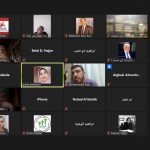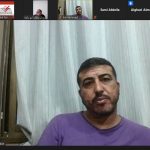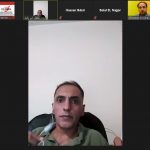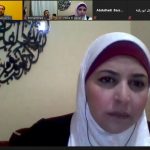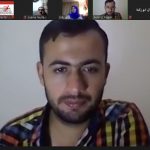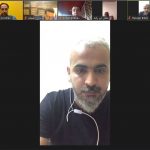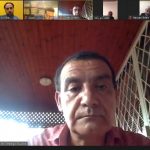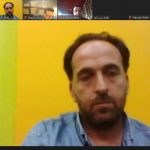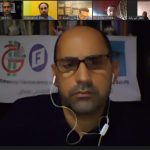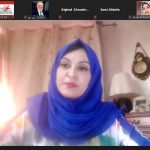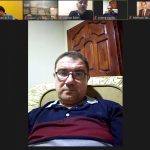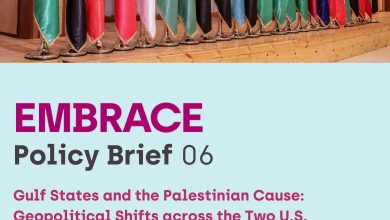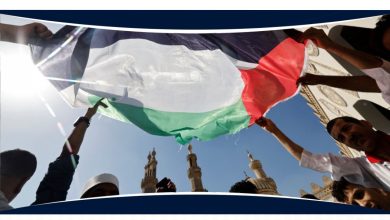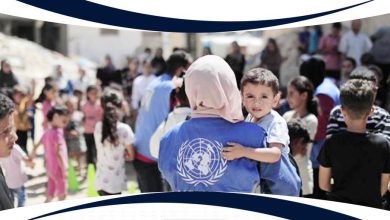Online Session Entitled Nonviolent Experiences and How to Use Them in The Palestinian’s Situation

Pal-Think for Strategic Studies arranged an online dialogue session via Zoom Program entitled Nonviolent Experiences and How to Benefit from Them in The Palestinian Situation. Two papers on the Rwandan experience and peaceful Palestinian models in the face of internal crises were discussed in the session. Besides, several intellectuals, researchers, and civil society organizations from the West Bank and Gaza Strip participated in the session.
This session came as a part of the ” The Palestinian Consortium for Non-violence: towards a regional movement on Non-violence” project which is still carrying out by Pal-Think and FXB France. for many years now. It is worth to mention that the project aims to promote peaceful behaviour and the language of dialogue for achieving community reconciliation.
Pal-Think’s project coordinator, Mrs Sally AlSammak, opened the session by saying that this session came as a part of the promotion of a non-violent culture, in which Pal-Think worked with many partner institutions in the Gaza Strip and West Bank to reach the greatest possible category. She also added that children, university students, housewives, patients were targeted. Besides, she noted that they managed to do mural drawings and launch social media campaigns.
AlSammak also stressed that Pal-Think had provided dozens of radio episodes aiming to disseminate the culture of nonviolence as a life approach. She also pointed out that it was remarkable to find acceptance from different groups of society, and local institutions’ interests to carry out such activities in marginalized areas.
Moreover, Pal-Think’s CEO, Mr Omar Shaban, emphasized that in Pal-Think they believe in a true partnership with civil society institutions. He also added that they work with as many of these institutions as possible. The CEO also clarified that they try to use their available resources jointly with all institutions from Rafah to Jenin, and Jerusalem, the capital.
Mr Shaban also said that this partnership has been going on for years, and with a variety of activities, from awareness initiatives to research papers, to radio episodes, to sessions of political reflection in which they are distinguished.
Then he stated that Rwanda is distinguished by its experience and also characterized by the highest economic growth in the world, and has become one of the best African countries, and it will have a great role in the coming years. After that, he added that they took this experience to say that the possibility is much better than it seems.
He also emphasized that they are not the only people who fought internally. On the contrary, the Palestinian internal conflict, Fateh-Hamas conflict, was not the longest or the most in the number of victims from South Sudan, South Africa, Colombia, or even Ireland, which has the most severe civil fighting.
Mr Shaban further noted that they wanted to generalize the results of the international experiences on the Palestinian political leadership, on the supporters of the Palestinian parties, and on all the different groups of the civil society, to say that it is possible better than it was.
As well as, Dr Talal Abu Rokba, the researcher, presented in his paper Nonviolent Models and How to Use Them in The Palestinian Situation some historical positions of the peaceful Palestinian way. Then he opened his intervention by thanking Pal-Think for its role in addressing delicate Palestinian issues and for its constant attempt to disseminate awareness in the Palestinian society. Besides, its nonstop contribution in seeking solutions by analysing other countries’ experiences; as if it is trying to say that the Fateh-Hamas conflict is not the end, and it can be overcome.
After that, he added this paper aimed to stress the culture of non-violence in Palestinian society, as it was the true expression of this society that has been characterized by tolerance and non-violence throughout its long history. Plus, it focused on how the Palestinian society has succeeded in addressing all its internal conflicts, especially societal differences, and confronting all its problems with a nonviolent culture that has always maintained its social fabric and civil peace.
Moreover, Abu Rokba focused on the fact that the Palestinian people were one of the first peoples on earth to adopt a peaceful resistance against the occupier, and this was embodied during the British Mandate, the First Intifada, and the March of Return.
Furthermore, he referred to historical Palestinian models that embodied a culture of non-violence, such as Palestinians taking arbitration and mediation during various occupation eras in confronting violence instead of colonialization laws to guarantee civil peace.
He also stressed that the Palestinian belief in the culture of dialogue in the face of structural imbalances in society helped in creating dialogue after Fateh-Hamas conflict through local initiatives. It is worth to mention that Pal Think was one of the first institutions which have succeeded in uniting Palestinian current situation, internal conflict, by presenting a paper to address the employee file, known as the Swiss paper.
The researcher pointed out that the Palestinians took the art as a means to face violence and express their crises through songs, paintings and poetry. For example, the victory of the Palestinian artist Mohammad Assaf was evidence on the importance of art in restoring the unity between the two parties of Palestinian society.
Abu Rokba continued by saying that the Palestinians also succeeded in employing sports to dispel the stereotypical image of the other Palestinian, people who are in Gaza versus People in West Bank, which began after the Fateh-Hamas conflict, and the occupation greatly contributed in creating this stereotype by preventing communication between the West Bank and Gaza Strip, through football matches such as the Palestinian final Cup match between the Hebron football team and Shejaeya’s youth football team.
It worth saying that the hospitality and mutual honour between the two teams were remarkable. Besides, fans who are at home or who managed to watch the matches from the stadium were an opportunity to correct this negative image which was left by the Fateh-Hamas conflict together with the occupation.
Abu Rokba concluded, what Palestinian society needs now is to believe in its ability to succeed and overcome Fateh-Hamas conflict. He also pointed out that this can be achieved by many Palestinian civil organizations that believe in the important role of the culture of non-violence and tolerance in restoring hope for unity and end this internal conflict.
As for the second research paper, The Rwandan Experience and How Can it help the Palestinian Situation, was presented by the Lawyer Mr Bilal Al Najar. He started by thanking Pal Think for its attempt in ending the Palestinian internal conflict by conveying the experiences of other countries to benefit from them.
The researcher reviewed the historical background and stressed on the conflict’s causes between the Hutu majority (Hutu), the Tutsi minority (Tutsi) and its impact on Rwanda.
Then he stressed the fact that the main way of ending the civil war and rebuilding included traditional and collective trials, strengthening unity and reconciliation, institutional reform, reparations. Also, the unification of fighting militias within the Rwandan army.
After that, Al Najar concluded by saying that the reconciliation does not mean – as it comes to mind – to obscure the truth and to ignore everything which happened, but rather to fulfil all of the components mentioned above.
In addition, the researcher said that the process of Palestinian reconciliation has many political and legal ways to implement it. He added, one of the most important means is to create mechanisms for dialogue and to promote a common identity among the divided Palestinian cities. Also, it is necessary to formulate a common community strategy that needs to be defended and protected by society.
At the end of the session, the participants’ questions and observations were raised about the need to develop agreed methodologies to promote peaceful behaviour. Besides, they emphasised the importance of developing child-oriented educational lessons aimed at instilling a culture of non-violence. Plus, the need for organizing systematic activities to inform citizens of their rights and duties, and the extent to which the parties of the conflict, Fateh-Hamas, can be bound by Palestinian law

